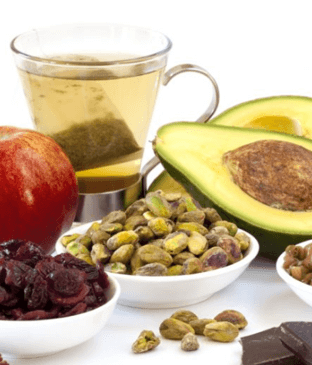Sugar is rightly recognized as a major contributor to heart disease and diabetes. But could sugar also play a role in cancer?
There is mounting interest in the possibility that intensive sugar restriction could favorably alter the course of cancer, not as a primary treatment but as an adjunct to conventional therapy.
The idea of a link between dietary sugar and cancer dates back as early as the 1920’s. Dr. Otto Warburg, a Nobel laureate who studied cancer cell metabolism, noted that cancer cells were glutinous consumers of glucose. Consequently, the sugar-hungry nature of some cancer cells came to be known as the Warburg effect.
Now fast forward nearly 100 years—we’ll begin with the role sugar metabolism has to play in cancer diagnostics. PET (Positron Emission Tomography) scanners are among the most important diagnostic tools to track the presence and extent of cancers throughout the body. PET scanners accomplish this feat by exploiting the sugar hungry nature of cancer cells. Radioactively labeled sugars injected into the bloodstream concentrate in cancerous tissue and light up when imaged with a PET scanner.
Connecting the Dots Between Sugar and Cancer
Beyond diagnostics, the question is whether cancer’s appetite for sugar can also be used to advantage as an adjunct for treatment. The goal of any cancer treatment is to identify a characteristic of cancer cells that differentiates it from healthy tissue and to find an intervention that preferentially acts on that difference.
Since cancer cells use more glucose than surrounding normal tissue, it is logical to believe that reducing the supply of glucose might selectively help to slow or even arrest tumor progression.
The most efficient way to reduce circulating levels of glucose is to drastically cut dietary carbohydrate intake to induce “ketosis,” or a shift in the body’s predominant fuel source from carbohydrate to fat. The reduction in carbohydrates needed to achieve ketosis goes far beyond simply cutting down on bread and sugary desserts.
Ketosis diets call for a bottoming-out of carbohydrate intake from the usual ~50% of daily calories to ~2%. The balance consists primarily of fat (90% of calories) and protein (8% of calories).
This very protocol has been used in several animal studies of cancer, where extreme carbohydrate restriction has been shown to limit tumor growth in mice for brain, prostate, and colon cancer.
Can a Low-Carbohydrate Diet Help?
But people are not large rodents, and the evidence in humans for carbohydrate restriction as an aid to cancer treatment is preliminary and inconsistent. A frequently cited dietary study evaluated 9 patients with rapidly progressive cancer. After a month of this severe carbohydrate restriction, repeat cancer scans in 5 of the 9 patients showed stable disease or partial remission. Interestingly, the 5 patients with a favorable response achieved a much more intense state of ketosis (burning fat rather than carbs) than those who did not respond.
Other small studies of patients who adopt a ketosis diet, typically with fewer than 10 patients, have reported remission even among some patients previously considered to be in a “palliative” stage of advanced cancer.
Bottom Line
Currently, the potential for intensive carbohydrate restrictive (ketosis) diets as a supportive treatment for cancer is unclear. However, there is intriguing data from animal studies that support its potential value, along with a few small studies in patients.
And the data that is available is focused on ketosis, a particularly profound form of carbohydrate restriction. Such extreme dietary shifts can be complicated to put together, can potentially result in other nutritional deficiencies, and have the potential for side effects, including nausea, constipation, headaches, and fatigue.
Nevertheless, many patients today with advanced stages of cancer do not have the luxury of time to wait for more conclusive studies and may wish to pursue a form of carbohydrate restriction as an addition to their ongoing therapy. The need to consider diet—at best—as an addition, not a replacement, to conventional medical treatment cannot be overstated.
The goal of this discussion is not to suggest by any means that a low-carbohydrate diet is the preferred approach (or even necessarily a useful one) for individuals with cancer. A Mediterranean-style diet, vegetarian diet, or vegan diet without the marked carbohydrate restriction could very well be a better choice. We just don’t have the data to make that judgment. The point is just to present some interesting early findings that deserve more study.
For the general population, there is little reason to consider an extremely low-carbohydrate diet; there is a great deal more evidence for the general healthfulness of the best versions of a Mediterranean-style diet and vegetarian/vegan diets. These are loaded with bountiful phytonutrients from vegetables and fruit, which are helpful for cancer prevention as well as cardiovascular health.
And, as with all dietary interventions, it’s essential to consider not only what is left out of the diet (largely carbohydrates here) but also what foods are consumed in their place. When carbohydrates are restricted, the nutrient focus shifts to fat and protein—and those calories should come primarily, if not exclusively, from high-quality plant sources. For fats, think avocados, nuts, seeds, and true extra-virgin olive oil; not butter and processed meats.
Most importantly, those dealing with cancer who wish to pursue dietary interventions should only do so in consultation with their oncologist, as well as under the guidance of an experienced dietary professional.
References:
Overview of Carbohydrate Restriction (Ketogenic Diets) and Cancer
Carbohydrate Restriction and Cancer in Animal Studies
Small Study of Carbohydrate Restriction in Patients with Advanced Cancer
Interested in eating better for your own health?
Learn the essentials of good nutrition in our interactive, user-friendly nutrition learning program for the public.
Clinicians: Do you feel confident responding to patient questions about nutrition?
Take our award-winning condensed interactive nutrition CME—and learn what every clinician should know about nutrition.



